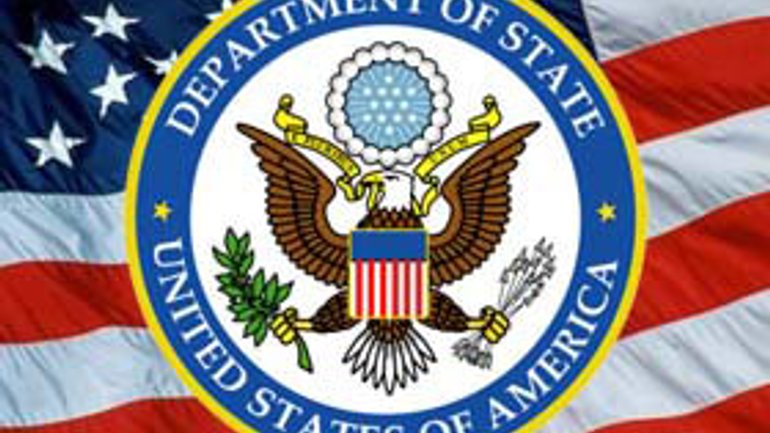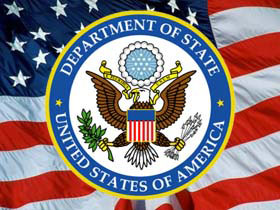US Human Rights Report Addresses Religious Freedom in Ukraine

 WASHINGTON – On March 11, 2010, the US State Department’s Bureau of Democracy, Human Rights, and Labor published the 2009 Country Reports on Human Rights Practices, including the Human Rights Report: Ukraine. The report includes an analysis of the process of restitution of church property in Ukraine and a separate chapter deals with the issues of religious freedom in Ukraine, reports the Institute of Religious Freedom.
WASHINGTON – On March 11, 2010, the US State Department’s Bureau of Democracy, Human Rights, and Labor published the 2009 Country Reports on Human Rights Practices, including the Human Rights Report: Ukraine. The report includes an analysis of the process of restitution of church property in Ukraine and a separate chapter deals with the issues of religious freedom in Ukraine, reports the Institute of Religious Freedom.
The most serious violations of human rights in Ukraine mentioned in the report [available in English] include statements about serious abuses by police, hard conditions in prisons, willful and long imprisonment prior to a trial, ineffective and corrupt judicial system, incidents of anti-Semitism, and facts of wide spread corruption in the executive power bodies and the society.
Section c. Freedom of Religion of Chapter two reads:
The constitution and the law provide for freedom of religion, and the government generally protected this right; however, some minority and nontraditional religions experienced difficulties in registration and in buying and leasing property. There is no formal state religion, but local authorities at times favored the religious majority in their particular regions.
The law requires that a religious group register its articles and statutes, either as a local or as a national organization, and have at least 10 adult members in order to obtain the status of a "juridical entity." Registration is necessary to conduct many business activities, including publishing, banking, and property transactions. The SCNR administers the registration process. Representatives from several denominations expressed satisfaction with the committee's work.
During the year the Jewish community reiterated complaints that the Krakivsky market in Lviv was located on the grounds of an ancient Jewish cemetery and that periodic digging to erect kiosks disturbed the sanctity of the site. The city had offered to construct a memorial park on the remaining undeveloped part of the cemetery but maintained that it could not relocate the market because some of the buildings were private property.
The representative in Crimea of the Ukrainian Greek Catholic Church complained that the Yalta Municipal Council refused to finalize the allocation of a land plot for the construction of what would be the only Greek Catholic church in the city. They also mentioned reluctance of municipal governments in Kyiv, Kyiv Oblast, Zhytomyr, Simferopol, and Yevpatoriya to allocate land for church construction.
Restitution of communal property confiscated during the Soviet era remained a problem.
Restitution of property taken from religious groups during the Soviet era continued at a slow pace, partly as a consequence of the country's economic situation. In addition, intracommunal competition for particular properties complicated restitution claims for the Christian, Jewish, and Muslim communities.
During the year the State Committee on Nationalities and Religion (SCNR) did not report on developments regarding property restitution. Previously, the SCNR stated that the majority of (most?) buildings and objects had already been returned to religious organizations. The remaining properties for which restitution was sought were occupied by state institutions, were historic landmarks, or had been transferred to private ownership. The SCNR stated that there was a lack of government funding to assist in relocating organizations occupying these buildings. The SCNR also noted that restitution claims frequently fell under the jurisdiction of local governments.
The law restricts the activities of foreign?based religious organizations and narrowly defines the permissible activities of the clergy, preachers, teachers, and other noncitizen representatives of foreign?based religious organizations; however, there were no reports that the government used the law during the year to limit the activity of such religious organizations.
The government promoted interfaith understanding by frequently consulting the All?Ukraine Council of Churches and Religious Organizations, whose membership represented the faiths of more than 90 percent of the religiously active population. The council met every two or three months to discuss interfaith concerns. Regional administrations and local religious leaders in most regions have formed regional councils of churches and religious organizations.
On January 15, the parliament adopted legislative amendments that give registered religious organizations the right to permanently use state-owned and communally owned land plots. On March 25, the Cabinet of Ministers reduced rental rates for religious organizations using state-owned property to 45 percent of rental fees charged to commercial entities.
On August 5, the Cabinet of Ministers issued a resolution facilitating registration procedures for foreign religious workers visiting the country. On September 3, the cabinet adopted a resolution reducing natural gas tariffs for religious organizations to the same level as housing sector tariffs.
Subsection Societal Abuses and Discrimination areas in particular:
There were reports of societal problems and discrimination based on religious belief and practice. Conflicts between local representatives of contending religious organizations continued to affect broader communal ties among religions in society.
On October 2, senior representatives of the Ukrainian Orthodox Church of the Moscow Patriarchate (UOC?MP) and the Ukrainian Orthodox Church of the Kyiv Patriarchate (UOC?KP) initiated a dialogue to seek resolution of long-standing disputes. Both sides described the meeting as encouraging and voiced cautious optimism about the prospects for further talks.
Tensions continued among the OUC-MP, UOC-KP, and the Ukrainian Autocephalous Orthodox Church (UAOC) when congregations attempted to change jurisdictions between the factions. For example, the UOC?MP, UOC?KP, and the local government did not resolve differences over the use of Holy Trinity Church in a village in Ternopil Oblast after the congregation split. In another example in Odesa, the UOC?KP and UAOC were unable to settle a dispute over the ownership of St. George Church that resulted when an archpriest in charge of the parish changed affiliation from the UOC?KP to the UAOC.
Vandalism of religious sites and monuments continued to be a problem. On June 17, Interior Minister Yuriy Lutsenko directed police to conduct more thorough investigations into cases of cemetery vandalism. During the first six months of the year, he said police had recorded 619 incidents of cemetery vandalism.
In August a construction company demolished a chapel used by the German Evangelical Lutheran Church and the Ukrainian Greek Catholic Church in Kherson. The company refused to implement a court ruling declaring the church a legitimate user of the land.
In Crimea the construction of a mosque in central Simferopol remained on hold. In February 2008 the city council annulled an earlier decision to allocate a plot of land to build the mosque and designated a less desirable location.
The country made some progress in relations with its Jewish communities; however, members of marginal populist and nationalist parties and organizations continued to make occasional extremist, intolerant, and anti-Semitic statements.
For a more detailed discussion, see the 2009 International Religious Freedom Report at http://www.state.gov/g/drl/rls/irf/.









